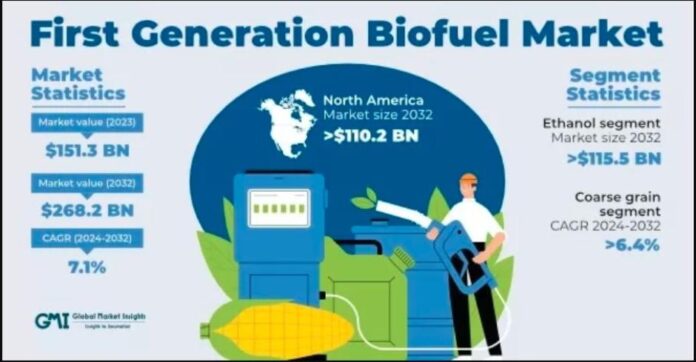The first generation bio fuel market size is estimated to register 7.1% CAGR between 2024 and 2032, driven by increasing global energy demand and the need for alternative energy sources to reduce dependency on fossil fuels.
First-generation biofuels, derived from food crops like corn, sugarcane, and soybeans, offer a renewable and more Eco-friendly energy solution compared to traditional fossil fuels. Several regulatory measures are aiming to reduce greenhouse gas emissions, promote energy security, and support rural economies by creating new markets for agricultural products.
Rapid technological advancements in biofuel production processes, which have improved the efficiency and cost-effectiveness of converting biomass into fuel will also influence the market growth. For instance, in June 2024, Neogen Corporation unveiled CelluSmart technology from Megazyme for measuring cellulosic ethanol from bio fuel production. The rising awareness of climate change and the need for sustainable energy solutions has bolstered consumer acceptance and demand for biofuels.
Chevron, Total Energies, and Future Fuel are expected to dominate the European first generation biofuel industry, largely due to their substantial investments in research, development, and infrastructure. These corporate leaders wield significant financial resources and possess advanced technological expertise, enabling them to drive innovation and effectively expand biofuel production operations.
Based on fuel type, the firstgeneration biofuel market from the bio diesel segment will generate notable revenue during 2024-2032 due to its versatile applications and compatibility with existing diesel engines, which facilitates seamless integration into current fuel infrastructure. The rising environmental concerns and stringent regulations aimed at reducing carbon footprints have led to increased adoption of bio diesel, particularly in the transportation and agricultural sectors.
In terms of application, the transportation segment is anticipated to witness substantial growth through 2032 due to the contribution of vehicles to global carbon emissions and the urgent need for cleaner fuel alternatives. First-generation bio fuels can be readily blended with traditional gasoline and diesel, allowing a smoother transition to greener fuels without requiring significant modifications to existing vehicle engines or fueling infrastructure.
Asia Pacific first generation bio fuel industry is slated to witness a significant growth rate through 2032 attributed to the presence of agricultural resources and strong governmental support for renewable energy initiatives. This local availability of raw materials is reducing production costs and enhancing the feasibility of bio fuel projects. Rapid urbanization and industrialization are also escalating the energy demands, leading to greater investments in sustainable and renewable energy sources, stimulating regional market growth.
Major players operating in the first generation biofuel industry are: Biogreen Synergy, Blue Son, Borregard, Caterpillar, Chevron, Coasan, DuPont, Future Fuel, Green Plains, among others.
GreentechLead.com News Desk

